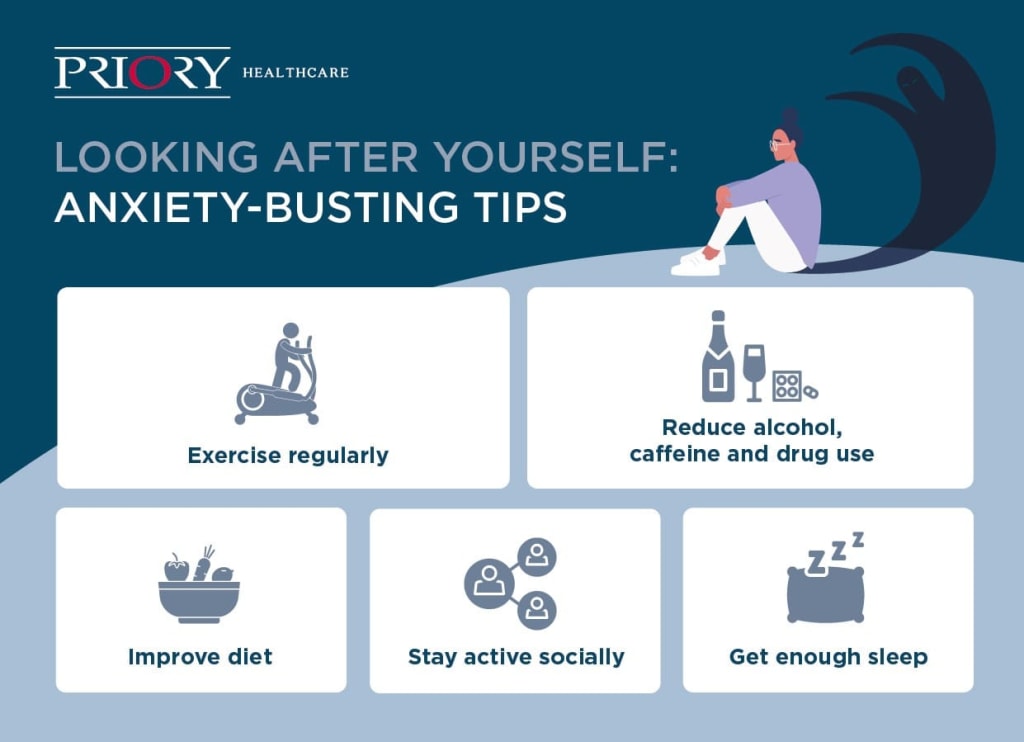How to deal with anxiety
dealing with anxiety, Anxiety

Dealing with anxiety can be challenging, but there are several strategies you can try to help manage it. Here are some suggestions:
Understand your anxiety: Educate yourself about anxiety and its symptoms. Knowing what triggers your anxiety can help you develop strategies to cope with it.
Practice deep breathing and relaxation techniques: Deep breathing exercises can help calm your mind and body. You can try techniques like diaphragmatic breathing, progressive muscle relaxation, or guided imagery to reduce anxiety.
Challenge negative thoughts: Anxiety often involves negative thoughts or excessive worrying. Practice identifying negative or irrational thoughts and challenge them with more realistic and positive ones. Cognitive-behavioral therapy (CBT) techniques can be helpful in this regard.
Maintain a healthy lifestyle: Take care of your physical well-being by eating a balanced diet, exercising regularly, and getting enough sleep. Engaging in regular physical activity can help reduce anxiety and improve your mood.
Establish a routine: Create a structured daily routine that includes activities you enjoy and that help you relax. Having a predictable schedule can provide a sense of stability and control, which can be helpful for managing anxiety.
Seek support: Talk to a trusted friend, family member, or therapist about your anxiety. Sharing your feelings and concerns with someone who understands and supports you can provide relief and perspective.
Practice self-care: Engage in activities that bring you joy and relaxation, such as hobbies, spending time in nature, reading, listening to music, or practicing mindfulness. Taking time for yourself and engaging in activities that recharge you can help reduce anxiety.
Limit stressors: Identify and limit exposure to situations, environments, or people that tend to trigger your anxiety. It's not always possible to avoid them entirely, but minimizing your exposure can be beneficial.
Consider professional help: If your anxiety significantly affects your daily life and you're struggling to cope, consider seeking professional help. A mental health professional can provide guidance, support, and possibly recommend therapies or medications if necessary.
Remember, different strategies work for different individuals, so it's important to find what works best for you. It may take time and experimentation to discover the most effective coping mechanisms for managing your anxiety.
Dealing with anxiety is an important aspect of maintaining good mental health. While I can provide some general strategies to cope with anxiety, please note that it's always a good idea to consult with a mental health professional for personalized advice. Here are some techniques that may help:
Understand and educate yourself: Learn about anxiety and its symptoms. Understanding what is happening in your mind and body can help demystify the experience and reduce anxiety's power over you.
Practice deep breathing and relaxation techniques: Deep breathing exercises can help activate your body's relaxation response and reduce anxiety. You can try techniques like diaphragmatic breathing, progressive muscle relaxation, or guided imagery.
Challenge negative thoughts: Anxiety often stems from negative or distorted thinking patterns. Pay attention to your thoughts and question their validity. Replace negative thoughts with more positive and realistic ones.
Maintain a balanced lifestyle: Take care of your physical well-being by getting enough sleep, eating nutritious meals, and engaging in regular exercise. A healthy lifestyle can contribute to overall mental well-being and reduce anxiety.
Establish a support system: Share your feelings and concerns with trusted friends, family members, or a support group. Having someone who listens without judgment and offers support can provide comfort during anxious times.
Practice mindfulness and meditation: Mindfulness involves focusing your attention on the present moment without judgment. Regular mindfulness practice, such as meditation or yoga, can help calm your mind and reduce anxiety.
Engage in relaxation activities: Find activities that help you relax and unwind, such as reading, listening to calming music, taking a bath, or spending time in nature. Engaging in enjoyable activities can distract your mind from anxious thoughts.
Set realistic goals and manage time effectively: Break down overwhelming tasks into smaller, manageable steps. Prioritize your tasks and create a schedule to avoid feeling overwhelmed and anxious.
Avoid excessive caffeine and alcohol: Stimulants like caffeine can increase anxiety levels, so it's beneficial to limit your intake. Similarly, excessive alcohol consumption can worsen anxiety symptoms, so it's best to moderate your alcohol consumption or avoid it altogether.
Seek professional help: If anxiety significantly interferes with your daily life or becomes overwhelming, consider seeking professional help. A mental health professional can provide you with tailored strategies, such as therapy or medication, to manage your anxiety effectively.
Remember, everyone's experience with anxiety is unique, and what works for one person may not work for another. It may take time to find the right combination of strategies that work for you, so be patient and compassionate with yourself as you navigate through managing anxiety.
About the Creator
Abdullah hameed
Hey, its Abdullah Hameed.
In my page you will find blogs on many topics. Which will help to increase your Knowledge.






Comments
There are no comments for this story
Be the first to respond and start the conversation.